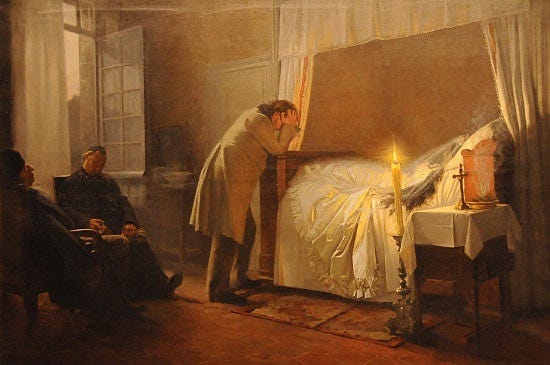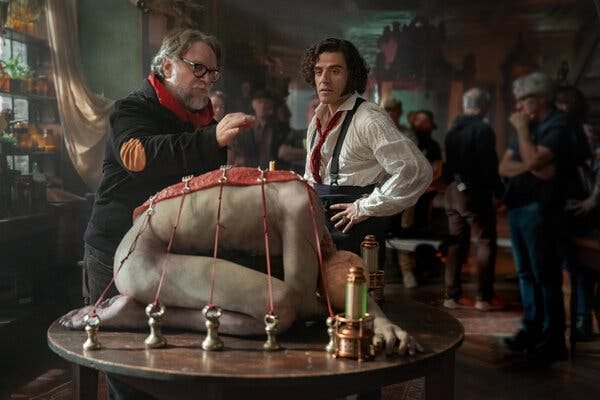Frankenstein is not a story of ego
How Grief Fragments Control
Since the retelling of Mary Shelley’s “Frankenstein” has made its way onto movie screens, a core interpretation of the story has emerged: a warning of the indulgence of the male ego and the consequences of seeking power. There is a thread of power throughout the story, of course, but not, as its interpreted, from megalomania.
When Victor gives life to the Creature, he is not obsessed with power or fame, nor is he seeking dominion from a false sense of supremacy. He is dissociated. He is numb. He is desperately hiding from the grief of losing his mother by losing himself in ambition. His ambition to create the Creature can look like ego, but it is not ego - it is shadow. He is afraid. Deathly afraid and afraid of death.
Death robbed him of his mother. As the eldest, Victor was grieving not only for his own loss but for his younger siblings. They wouldn’t know their mother, as he did. He would be alone in his own memories of her. He felt for the first time fragile.
The person who gave him life was lost, and he flounders. If you know death, you know the dark fog of grief that clings to the edges of your skin, blurs your vision and rings in your ears. Life after death is marked by death. Every step forward in life is stepping through a sticky bog, leaving the person lost further behind. Victor is left existentially alone by continuing to university after the death of his mother. At university, no one knew Victor’s mother. No one knew her voice, her face and soon he questioned if he even did. He is alone in the darkness of his grief. He is nearly swallowed by it completely until he creates for himself a companion who is born of death.
With the Creature, he is not alone in the fog of death and he is horrified. He runs. Just as he fled from his mother’s death, he flees from the Creature.
In grief, “there is nothing I could do” stings inescapably. There is a powerlessness to death. It is the only certainty in life. Victor couldn’t save his mother from the fever that took her life in the place of his betrotheds. Victor is haunted by the powerlessness of grief. Death taunts him with the memory of his mother. He is helpless to the pain of this loss and he is vulnerable in his aloneness. He felt this vulnerability and he knew he needed to protect himself. But protecting yourself is hard when you’re alone. So he turned to control.
Giving the Creature life is Victor finding control in an otherwise powerless experience. If he were to sit in the truth of his loss, he would be utterly consumed by it. So instead, he externalizes it.
The Creature is a manifestation of Victor’s grief. Within its stitched fragments, there exists all the love Victor has for his mother. Grief, after all, is an expression of love. How much we love has a direct correlation to how much we grieve. But grief is not only love, it is also guilt. Powerlessness. Rage. Shame. Masking. Hiding.
I do know that with the sympathy of one living being I would make peace with all. I have love in me the likes of you can scarcely imagine. And rage, the likes of which you would not believe. If I cannot satisfy the one, I will indulge the other.
Back in Geneva, his family shared the burden of grief. They spoke of her often. Her portraits lived on the walls. They breathe the air she once did. They retraced her footsteps on walking trails. The people of the town knew her, loved her, remembered her. Victor’s family was held in their grief. He was alone.
This is not a story of male ego, this is a story of male loneliness. The epidemic has not improved since 1816 when Victor was first brought to life on the pages of Mary Shelley’s pages.
I often hear a deep shame from male clients, a shame of feeling. It is this nagging fear that “negative” feelings have the potential to infect those around them. The emotion is the problem and must be quarantined. The Creature is Victor’s perilous attempt to rid himself of grief for good. But his grief is part of his love, his grief is his humanity. In projecting his grief into the Creature, Victor loses what makes him human. He becomes consumed with shame, fear and isolation - all that he was trying to purge. And the Creature, a being of grief, is full of curiosity, love, desire for closeness.
Victor’s grief made him human and by controlling it, rather than relating to it, he becomes inhuman.
And that is the cost of male loneliness - isolation strips humanity. Our emotions are what make us human. We share the fragility of life, we share the feeling of love and loss and within the threads of emotion, we are Alive. Men have their emotion driven from them with shame, terror and humiliation. Men are alone in the world, fleeing from their grief and petrified of powerlessness. Men spend their whole lives running from their feeling, trying to control what needs to be related to.
It is Victor’s rejection of the depth of his grief, his fear of sharing his feeling, his expectation he must be alone, that drives him to create the Creature. In Victor’s shadow is his vulnerability. He compensates the fragility of death with control and becomes the Creature - inhuman.
The story of Frankenstein is a warning, but not of the male ego. It is a warning of male loneliness and the consequences of compensating vulnerability with control. It is an invitation for men to feel the feelings they’ve been told make them weak and allow themselves to be human.






Who is pointing to Prometheus?